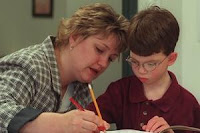Six-Step Plan for Teachers of Aspergers Students

Following the six-step plan, detailed below, will help prepare you for the entrance of a youngster with Aspergers (high functioning autism) in your classroom, as well as foster inclusion throughout the school. The steps are as follows: (1) educate yourself; (2) reach out to the moms and dads; (3) prepare the classroom; (4) educate peers and promote social goals; (5) collaborate on the implementation of an educational program; and (6) manage behavioral challenges. Step 1: Educate Yourself— As the person responsible for the education and behavior management of all your children, including a youngster with Aspergers, you must have a working understanding of Aspergers and its associated behaviors. Different behaviors are very much a part of Aspergers. When kids with Aspergers do not respond to the use of language or act out in class, it is typically not because they are ignoring you, trying to clown around, or waste class time. These behaviors may be more related to their Asper


